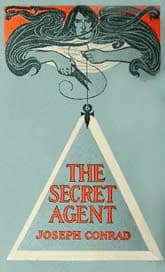The Secret Agent
Critique Quotes At the movies
 First U.S. edition, 1907
First U.S. edition, 1907Original title
The Secret Agent: A Simple Tale
First publication
1907
Literature form
Novel
Genre
Literary, crime, espionage
Writing language
English
Author's country
England
Length
Approx. 93,500 words

Verloc (David Suchet) is confronted by Chief Inspector Heat (Warren Clarke) in 1992 series.
The secret's out
The Secret Agent (1992): TV miniseries, three episodes, 180 minutes; director David Drury; writer Dusty Hughes; featuring David Suchet, Cheryl Campbell, Peter Capaldi, Warren Clarke, Patrick Malahide
It was another fifty-six years after Alfred Hitchcock's treatment of Joseph Conrad's The Secret Agent before another adaptation, this one much more faithful to the story, characters and tone of the novel.
The 1992 television miniseries, The Secret Agent, may be less suspenseful or exciting than Hitchcock's entertainment but in its own literary fashion it's actually quite gripping. The three hours of the BBC series are enough to delve into all the machinations of the anarchist conspirators, the London police, and the Russian diplomats who are behind the bombing. It's similar in some respects to the more thoughtful films based on John Le Carr้ novels. But there is no great mystery at the heart of The Secret Agent, except for the motivations of the characters, both central and periphery, which are gradually revealed and developed.
But most time is given to the relationship of the would-be agent provocateur Adolph Verloc (yes, the besmirched given name is returned to the character), his wife Winnie and her simple-minded brother Stevie.
The story revolves, as it should, especially on the conflicted figure of Verloc. David Suchet has done more than swap moustaches in distancing himself from the Poirot character he is best known for. His posture, his movement, his facial expressions, his very eyes all work to transform him into the powerless, obstinate, guilt-wracked little man created by Conrad as both perpetrator and victim. It's a brilliant performance that relies little on dialogue. In his quiet way he dominates.
The story seems to run out of steam when he leaves the scene and the last act is turned over to Winnie. She is endearingly and tragically portrayed by stalwart British actor Cheryl Campbell. But however well this part of the story is handled, the change of focus makes the ending seem anticlimactic. To be fair, at least some of the blame may be attached to Conrad's original story structure with the fateful bombing taking place near the halfway point and the demise of the main character coming about three-quarters of the way through. The last part of the production comes across as a unconvincing attempt to assert, despite what has gone before, Verloc's wife really has been the central character all along.
Trailer for the three-part miniseries of Conrad's The Secret Agent on BBC2.
The series displays all the sumptuousness associated with Masterpiece Theatre productions, with the slightly stagy drama taking place in the dank backstreets of the Verloc pornography business, the richly textured halls of British and Russian officials, and the sparkling social scenes of the London upper classes.
It may not be the most exciting or modern take on The Secret Agent but it gets across the times Conrad was writing about. And what he had to say about them.
— Eric

